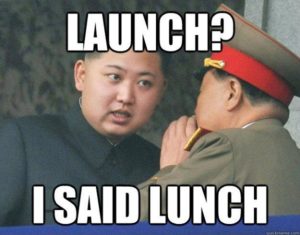Source: quickmeme.com
 The hacking of Sony Pictures’ The Interview generated a wave of amusement and derision towards the suspected North Korean culprits that came as no surprise to internet surfers. Try a Google search on Kim Jong Un and you will quickly find some of the many, many memes the supreme leader of North Korea has generated. North Korea’s belligerently inept actions and the bizarre stories surrounding Kim Jong Un and his father have been relentlessly lampooned by the razor wit of the internet. While there are grounds for the sea of memes that surrounds the Hermit Kingdom online, there is also a danger. Our perceptions of matters just outside our field of experience are being shaped by images that exist not for political gain, but simply for humor. Without understanding or agenda, the internet is generating a narrow form of popular knowledge that exists simply to amuse, and disseminates exaggerated, fictionalized versions of reality to the public through relentless repetition and the most effective tool of all: funny memes. We have invented our own North Korea built upon the work of would-be internet comedians.
The hacking of Sony Pictures’ The Interview generated a wave of amusement and derision towards the suspected North Korean culprits that came as no surprise to internet surfers. Try a Google search on Kim Jong Un and you will quickly find some of the many, many memes the supreme leader of North Korea has generated. North Korea’s belligerently inept actions and the bizarre stories surrounding Kim Jong Un and his father have been relentlessly lampooned by the razor wit of the internet. While there are grounds for the sea of memes that surrounds the Hermit Kingdom online, there is also a danger. Our perceptions of matters just outside our field of experience are being shaped by images that exist not for political gain, but simply for humor. Without understanding or agenda, the internet is generating a narrow form of popular knowledge that exists simply to amuse, and disseminates exaggerated, fictionalized versions of reality to the public through relentless repetition and the most effective tool of all: funny memes. We have invented our own North Korea built upon the work of would-be internet comedians.

North Korea has a complicated history with both enemies and allies. This history and culture is generally unknown in the United States, as little emerges from the strict controls of the regime in control of the state. Even South Korea, an ally of the United States for sixty years, is a relatively unknown quantity to the American public aside from Korean soap operas on Hulu, K-Pop sensations, and reruns of the 1970s TV series M.A.S.H.. A quick search for classes on Korean history in American universities will yield few results. As recently as early February a bank in California refused to exchange South Korean currency, claiming they do not deal in money from communist nations, conflating the oppressive North with the democratic South. Korea occupies a peripheral space in American popular consciousness as its position as a front line in the Cold War has faded fast from popular memory, if not in geopolitical fact.
Political satire has a long history, as does the process of demonizing enemies and other peoples. Elements of the British press, eager to diminish the threat of Napoleon, consistently portrayed him as a small man in political cartoons. Records show Napoleon was around the average height for a British male at the time. Yet the image of Napoleon as a short tyrant has persisted in popular culture to the modern day. Racist imagery before and during World War II consistently depicted Japanese as short, bucktoothed, and bespectacled—an image that also refused to easily disappear, showing up in Bugs Bunny cartoons and Mickey Rooney’s version of I.Y. Yunoshi in 1961’s Breakfast at Tiffany’s. Similar images existed for Chinese in America in the late 1800s, with added negative commentary on diet and cleanliness.

These negative images carried underlying political and social motivations and furthered the agenda of particular groups. The British press wanted to minimize the perceived power of Napoleon among British citizens. Negative images of Chinese were used by nativist Americans to push for the Exclusion Acts, which barred Chinese immigration into the United States. Images of Japanese as weak invigorated a sense of American superiority and prepared a nation for war after the shock of Pearl Harbor. Today, the generation of unflattering images of North Korea and Kim Jong Un only further a general disdain for the Hermit Kingdom as impotent and a joke, ideas made more dangerous by wrapping them in often viciously funny humor. Unintentionally, internet memes on North Korea obscures the situation by relegating the matter to that of comedic insignificance and an absurdist narrative of incompetence just as effectively as any orchestrated campaign.
Popular culture often fills in the blanks for missing knowledge. During a graduate course I took in French history, someone asked if France sent soldiers to fight in the Korean War. The class fell silent as the answer to that particular query proved elusive and wifi reception was terrible in that particular classroom. After a few uncomfortable moments, I asked, “Wasn’t there a French officer in M.A.S.H.?” Although I spoke mostly in levity, it was also the only connection between France and the Korean War that came to mind. The comment clicked with the class, giving us a common frame of reference and a shared body of knowledge that jumpstarted a discussion. For the record, we were pretty sure it was a Belgian officer that showed up at the 4077th field hospital, although a later internet check revealed the French were indeed involved in the Korean conflict. The avalanche of memes on North Korea fill in the blanks with an unintended history of comedic irrelevance.

The internet is a machine of cultural production that operates at an astounding speed. Memes and odes to Left Shark appeared within hours of Super Bowl XLIX. The collective denizens of the internet relentlessly examines, skewers and discards current events in a true war of immediacy. Getting there first with the funniest drives the unknown creators of internet memes. These producers hold no better knowledge of Korea than anyone else, but they are able to elevate their ideas to a level beyond any article in the Economist or Foreign Policy through the simplicity of humor and easy click sharing of infectious memes. Their fictions are quietly absorbed into a greater idea of North Korea. As more and more elements outside our experience enter our lives, internet culture stands ready to provide commentary and mold popular ideas, but who watches the jesters? As Marshal McLahan stated, the medium has become the message. Our perceptions are shaped not by experience or experts, but by the fastest and funniest online. The goal of humor has overwritten the very concept of the North Korean state, which leaves us ill-prepared to grapple with reality.



